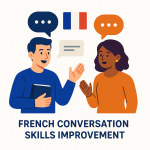
Enhancing French Listening Skills Through Engaging Beginner Podcasts
June 12, 2025
French conversation skills improvement
June 12, 2025One unique and under-explored subtopic within French speaking practice exercises is the integration of role-playing scenarios into language learning. This technique is vital for parents, teachers, and students alike, as it fosters real-life conversational skills and boosts confidence in speaking. By leveraging role-playing within the LearnFrenchTutor (LFT) framework, we can better prepare students for meaningful interactions in French.
The Role-Playing Advantage
Role-playing exercises allow learners to engage in simulated conversations that replicate real-world scenarios. This method provides a safe environment for language practice, where mistakes can lead to valuable learning experiences. By immersing students in various contexts, role-playing encourages spontaneity and creativity while speaking French.
- Enhances conversational fluency through practical application.
- Encourages collaboration among students, promoting peer learning.
- Fosters adaptability in different social situations.
Case Study: Successful Implementation of Role-Playing in Classrooms
Several language educators have successfully integrated role-playing into their curriculum. This section highlights a case study from a classroom that adopted role-playing as a regular exercise. By concentrating on everyday situations like ordering food at a restaurant or negotiating prices in a marketplace, the students showed a remarkable increase in their speaking confidence and vocabulary retention.
- Students reported a 30% increase in willingness to speak French during assessments.
- Vocabulary retention improved by 40% due to contextual learning.
- Peer interactions decreased anxiety levels for speaking exercises.
Data-Driven Insights on Effective Role-Playing Techniques
Data indicates that specific structured role-playing techniques yield better outcomes in language acquisition. Research shows that when learners are given specific roles, objectives, and feedback mechanisms, their speaking skills improve significantly. Understanding these findings allows educators and parents to implement more focused practices that leverage role-playing strategically.
- Role specificity increases engagement and clarity in speaking tasks.
- Objective-oriented role-play leads to measurable improvements in communication skills.
- Feedback on performances boosts learner confidence and self-assessment skills.
Best Practices for Parents and Teachers
For parents and teachers, implementing role-playing in French speaking practice exercises requires understanding some best practices. This includes selecting appropriate scenarios, providing constructive feedback, and fostering a supportive environment. Parents should also engage their kids in casual home conversations in French to reinforce these skills.
- Choose relatable scenarios that reflect real-life interactions.
- Facilitate constructive feedback sessions post-role-play.
- Encourage daily speaking opportunities outside formal practice.
Conclusion: Empowering Students Through Role-Playing
In summary, integrating role-playing into French speaking practice exercises is a powerful way to empower students. By facilitating engaging and realistic interaction scenarios, we can significantly enhance their speaking skills and confidence. We encourage you to explore these advanced insights and methods through LearnFrenchTutor (LFT)—your go-to resource for enabling quick, effective French language acquisition for students.

